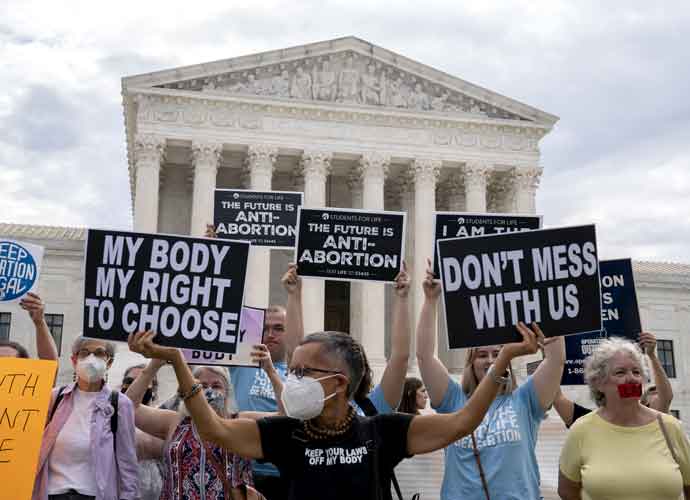Supreme Court Upholds Texas Abortion Ban In 5-4 Decision
The United States Supreme Court on Friday upheld Senate Bill 8, a controversial Texas law banning abortions after six weeks with no exceptions for rape and incest that deputizes private citizens to stalk and sue patients seeking the procedure as well as anyone who “aids and abets” it.
In its 5-4 opinion, the Court made clear that it was not determining the constitutionality of S.B. 8, but rather how it can be challenged. In the meantime, however, the prohibition will remain in effect.
The Austin-American Statesman explained that “the ruling will allow abortion providers to return to a district court judge in Austin and argue their case, essentially restarting the complicated legal battle over the law that has intensified the national debate over abortion and raised questions about when states can be sued over laws they adopt.”
Associate Justice Neil Gorsuch, who was one of three right-wing jurists appointed by former President Donald Trump, wrote that “because the Court granted certiorari before judgment, the Court effectively stands in the shoes of the Court of Appeals and reviews the defendants’ appeals challenging the District Court’s order denying their motions to dismiss. As with any interlocutory appeal, the Court’s review is limited to the particular order under review and any other ruling ‘inextricably intertwined with’ or ‘necessary to ensure meaningful review of’ it. Swint v. Chambers County Comm’n, 514 U. S. 35, 51. In this preliminary posture, the ultimate merits question, whether S.B. 8 is consistent with the Federal Constitution, is not before the Court. The Court concludes that the petitioners may pursue a pre-enforcement challenge against certain of the named defendants but not others,” adding that “other pre-enforcement challenges are possible too; one such case is ongoing in state court in which the plaintiffs have raised both federal and state constitutional claims against S.B. 8. Any individual sued under S.B. 8 may raise state and federal constitutional arguments in his or her defense without limitation. Whatever a state statute may or may not say about a defense, applicable federal constitutional defenses always stand available when properly asserted.”
Subscribe to our free weekly newsletter!
A week of political news in your in-box.
We find the news you need to know, so you don't have to.
Supporters of abortion rights argued in Whole Women’s Health versus Jackson that S.B. 8 is unconstitutional and places undue burdens on patients. So-called pro-lifers maintained that electrical signals inside the fetus constitute a heartbeat, making it alive, meaning that terminating a pregnancy is tantamount to murder.
Associate Justice Sonia Sotomayor, an appointee of former President Barack Obama, authored a blistering dissent.
“The Court should have put an end to this madness months ago, before S.B. 8 first went into effect. It failed to do so then, and it fails again today. I concur in the Court’s judgment that the petitioners’ suit may proceed against certain executive licensing officials who retain enforcement authority under Texas law, and I trust the District Court will act expeditiously to enter much-needed relief. I dissent, however, from the Court’s dangerous departure from its precedents, which establish that federal courts can and should issue relief when a State enacts a law that chills the exercise of a constitutional right and aims to evade judicial review. By foreclosing suit against state-court officials and the state attorney general, the Court effectively invites other States to refine S. B. 8’s model for nullifying federal rights,” Sotomayor wrote. “The Court thus betrays not only the citizens of Texas, but also our constitutional system of government. I have previously described the havoc S.B. 8’s unconstitutional scheme has wrought for Texas women seeking abortion care and their medical providers.1 I do not repeat those details here, but I briefly outline the law’s numerous procedural and substantive anomalies, most of which the Court simply ignores.”
Chief Justice John Roberts, whom former President George W. Bush added to the bench, also called S.B. 8 a blatant power grab by Texas Republicans.
“The clear purpose and actual effect of S.B. 8 has been to nullify this Court’s rulings. It is, however, a basic principle that the Constitution is the ‘fundamental and paramount law of the nation,’ and ‘[i]t is emphatically the province and duty of the judicial department to say what the law is.’ Marbury v. Madison, 1 Cranch 137, 177 (1803). Indeed, ‘[i]f the legislatures of the several states may, at will, annul the judgments of the courts of the United States, and destroy the rights acquired under those judgments, the constitution itself becomes a solemn mockery.’ United States v. Peters, 5 Cranch 115, 136 (1809),” he said. “The nature of the federal right infringed does not matter; it is the role of the Supreme Court in our constitutional system that is at stake.”
Get the most-revealing celebrity conversations with the uInterview podcast!








Leave a comment